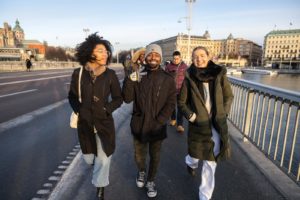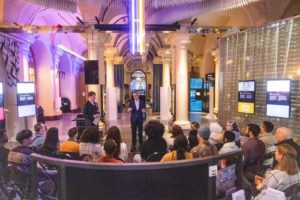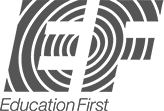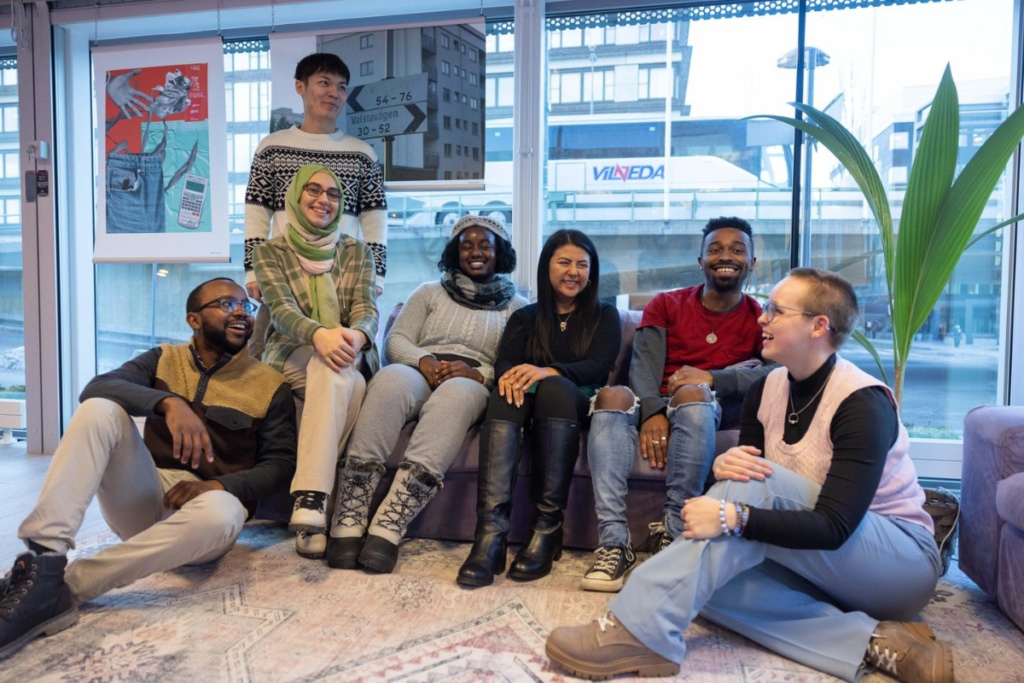
Fueled by a common belief that in order to change the world you need to experience it, EF Study Abroad and The Forum on Education Abroad created a first-of-its-kind, high-impact student scholarship program, in collaboration with EF’s educational partner the Nobel Prize Museum. Launching in 2021, we are excited to send our second cohort on this amazing experience in December 2022.
During this fully-funded program, selected students will participate in an online project-based course, travel to Sweden for an international field study, attend sessions at the 2022 Nobel Week Dialogue: a collaborative event that brings some of the world’s leading scientists, policymakers, and thinkers together to explore scientific topics through a global lens, and be given the opportunity to have their projects displayed in an exhibit in the Nobel Prize Museum.
Future leaders from all over the world were invited to apply to this prestigious program. To be considered for selection, all students were asked to apply with a statement responding to the following prompt along with a letter of nomination from a faculty member or administrator familiar with the student’s academic work:
The future of humanity
Nobel Laureates have been recognized for their lifelong research and efforts that have saved lives, saturated humanity, protected the planet, and connected people – their efforts have been crucial to our world and our future.
Overarching Question: What is the next big effort that is crucial to the development of our world and future and how does this effort advance equity and justice?
Additional questions to consider:
What research and action is necessary?
How might you make a local impact on your campus, community, or beyond as it relates to equity, justice, and the greater development of our world and future?
What steps might you take and how might you implement your idea(s) to create sustainable change?
Consider the themes presented within the sustainable development goals as well as the Nobel Prize-winning ideas.
This scholarship program received an overwhelming response from highly qualified applicants, and we are thrilled to introduce you to the 10 incredible students who were selected as 2022 scholarship recipients. Continue reading to meet this year’s winners and read excerpts of their statements and check out the program these students will be participating in here.
2022 Scholarship Recipients
Alexander Farley- Master’s student, University of Utah
Project topic: Renewable energy
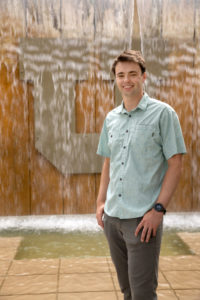 Project Statement: The climate crisis is the greatest challenge today’s world faces. It is well understood that the Global South and underserved communities across the world will bear the brunt of the immediate effects of climate change. Shifting to carbon-free renewable energies is a critical step in limiting this damage. However, a green energy transition is not necessarily a just transition. As of now in the US, the majority of residential renewable energy systems are purchased and privately owned by a single household, placing a significant barrier of entry in that you first need to own a home and second, have available capital to invest in a renewable energy system. In addition to this, grid operators must make updates to current infrastructure to accommodate more distributed renewable energy systems. These upgrades are financed by increasing energy rates, increasing energy burden on low-income communities. Community renewable energy systems (CES) are a compelling solution towards a more equitable energy transition. They allow for any community member to “subscribe” to the system and reap the benefits of shared renewables with greater accessibility. Not only this, but a CES improves energy democracy by empowering locals to actively participate in their energy production. I propose an interdisciplinary project to design a more equitable, democratic, and advanced CES by integrating tenants of social justice with cutting-edge power systems engineering to create a holistic and truly just CES.
Project Statement: The climate crisis is the greatest challenge today’s world faces. It is well understood that the Global South and underserved communities across the world will bear the brunt of the immediate effects of climate change. Shifting to carbon-free renewable energies is a critical step in limiting this damage. However, a green energy transition is not necessarily a just transition. As of now in the US, the majority of residential renewable energy systems are purchased and privately owned by a single household, placing a significant barrier of entry in that you first need to own a home and second, have available capital to invest in a renewable energy system. In addition to this, grid operators must make updates to current infrastructure to accommodate more distributed renewable energy systems. These upgrades are financed by increasing energy rates, increasing energy burden on low-income communities. Community renewable energy systems (CES) are a compelling solution towards a more equitable energy transition. They allow for any community member to “subscribe” to the system and reap the benefits of shared renewables with greater accessibility. Not only this, but a CES improves energy democracy by empowering locals to actively participate in their energy production. I propose an interdisciplinary project to design a more equitable, democratic, and advanced CES by integrating tenants of social justice with cutting-edge power systems engineering to create a holistic and truly just CES.
Amy Finnegan- University College Dublin
Project topic: Fast Fashion
 Project Statement: I initially applied for the programme with the idea of demonstrating the environmental and feminist impact the fast fashion industry has in modern society. The harmful effects of fast fashion have become a growing concern of mine since starting college and have been very influenced by my eldest sister who shares similar beliefs. Together we make strong efforts to resist the temptation to buy fast fashion and have sought alternative more sustainable means of feeding our fashion interests. Alex, Wai and I have brought our environmental concerns together. We have paired their knowledge of energy systems and my interest in the harmful effects of fast fashion to see whether there are possible solutions to minimize the detrimental impacts of the industry.
Project Statement: I initially applied for the programme with the idea of demonstrating the environmental and feminist impact the fast fashion industry has in modern society. The harmful effects of fast fashion have become a growing concern of mine since starting college and have been very influenced by my eldest sister who shares similar beliefs. Together we make strong efforts to resist the temptation to buy fast fashion and have sought alternative more sustainable means of feeding our fashion interests. Alex, Wai and I have brought our environmental concerns together. We have paired their knowledge of energy systems and my interest in the harmful effects of fast fashion to see whether there are possible solutions to minimize the detrimental impacts of the industry.
Bautista Vivanco- Winthrop University
Project topic: Intergroup Dialogue
 Project Statement: Racism, xenophobia, and discrimination are grave issues that people face in every country around the globe. They exist because we humans tend to be cautious in our approach to the unknown, and the pandemic has shown how this wariness is often exploited by bad actors who aim to use discordance and hatred in order to gain political or social legitimacy. However, the seed of intolerance cannot grow in the minds of those exposed to true cultural and racial diversity. For this reason, the elimination of bigotry and the pursuit of justice and equity must begin by teaching the younger generations, the leaders, and social actors of tomorrow, the importance of being open-minded and receptive to people with different opinions and perspectives. As an international student myself, I can attest to how much my experience abroad has opened my eyes to the immense value that people different from me have to offer. Therefore, it is imperative to promote more cultural and social exchanges, not just for students in influential countries, but from the entire globe, in order to foster a deeper understanding and empathy in our societies towards those who might be dismissively called “outsiders”.
Project Statement: Racism, xenophobia, and discrimination are grave issues that people face in every country around the globe. They exist because we humans tend to be cautious in our approach to the unknown, and the pandemic has shown how this wariness is often exploited by bad actors who aim to use discordance and hatred in order to gain political or social legitimacy. However, the seed of intolerance cannot grow in the minds of those exposed to true cultural and racial diversity. For this reason, the elimination of bigotry and the pursuit of justice and equity must begin by teaching the younger generations, the leaders, and social actors of tomorrow, the importance of being open-minded and receptive to people with different opinions and perspectives. As an international student myself, I can attest to how much my experience abroad has opened my eyes to the immense value that people different from me have to offer. Therefore, it is imperative to promote more cultural and social exchanges, not just for students in influential countries, but from the entire globe, in order to foster a deeper understanding and empathy in our societies towards those who might be dismissively called “outsiders”.
Chioma Opara- UMASS Amherst
Project topic: Health Equity
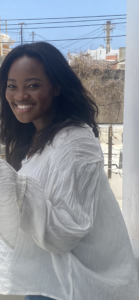 Project Statement: Our health is the center of our lives and one of the most important conditions that determines our ability to sustain ourselves. Despite that, not a single country has achieved health equity. The next big effort that’s crucial to the development of our world and the advancement of justice is health equity.
Project Statement: Our health is the center of our lives and one of the most important conditions that determines our ability to sustain ourselves. Despite that, not a single country has achieved health equity. The next big effort that’s crucial to the development of our world and the advancement of justice is health equity.
Many factors that lead to health disparities find their foothold in social inequality, which is why advocating for and addressing health equity isn’t simply pushing for health care to be more widely available. We must also observe and mitigate factors that lead to health disparities in the first place (i.e. violence and poverty). My proposition is that we research factors that give rise to health inequity and understand how to address them in order to mitigate the severity of social inequality and health disparities. Throughout my semester, I conducted research for a local hospital’s needs assessment report, and I’ve come to see that health equity is an issue that needs to be addressed with great urgency. If our goal is to advance justice, then our first step should be to make sure that everyone has the ability to access healthcare without worrying about the constraints of social issues.
Daryl Mifsud-Earlham College
Project Topic: Decolonization
 Project Statement: I grew up constantly reminded of my people’s colonized past and realized the deeply rooted consequences present in societies with similar histories through the detrimental effects of existing colonial structures and institutions. I believe that the next significant effort toward advancing equity and justice surrounds the various work of decolonizing efforts that promote sustainable decolonial development initiatives to combat systems of exploitation and oppression. Decolonizing efforts is a broad framework one can apply to multiple sectors in society at a local, national, and international level through; Education institutions by dismantling enduring colonial structures that promote the elevation, romanticization, demonization, and erasure of selected historical events, language, and cultural traits of the affected communities. Governmental establishments, through relinquishing persisting colonial dictated and influenced economic, administrative, diplomatic, and social policies. International relations by advocating and removing the asymmetric and exploitative relationship between countries, especially between former colonizers and colonized countries.
Project Statement: I grew up constantly reminded of my people’s colonized past and realized the deeply rooted consequences present in societies with similar histories through the detrimental effects of existing colonial structures and institutions. I believe that the next significant effort toward advancing equity and justice surrounds the various work of decolonizing efforts that promote sustainable decolonial development initiatives to combat systems of exploitation and oppression. Decolonizing efforts is a broad framework one can apply to multiple sectors in society at a local, national, and international level through; Education institutions by dismantling enduring colonial structures that promote the elevation, romanticization, demonization, and erasure of selected historical events, language, and cultural traits of the affected communities. Governmental establishments, through relinquishing persisting colonial dictated and influenced economic, administrative, diplomatic, and social policies. International relations by advocating and removing the asymmetric and exploitative relationship between countries, especially between former colonizers and colonized countries.
These factors contribute to a range of issues that plague oppressed and marginalized BIPOC communities through the effects of brain drain, inferiority complex, economic and health inequality, and environmental exploitation – which tie back to utilizing decolonial frameworks for a sustainable, equitable, and just future.
Devynn LeJeune- St. Louis Community College
Project topic: Clean Water Access
 Project Statement: Clean water is a human right. Minorities in poor areas suffer vastly from a lack of clean water, like Detroit, and Africa. Creating a global purified water system is the next step for our future. These factors contribute to a range of issues that plague oppressed and marginalized BIPOC communities through the effects of brain drain, inferiority complex, economic and health inequality, and environmental exploitation – which tie back to utilizing decolonial frameworks for a sustainable, equitable, and just future.
Project Statement: Clean water is a human right. Minorities in poor areas suffer vastly from a lack of clean water, like Detroit, and Africa. Creating a global purified water system is the next step for our future. These factors contribute to a range of issues that plague oppressed and marginalized BIPOC communities through the effects of brain drain, inferiority complex, economic and health inequality, and environmental exploitation – which tie back to utilizing decolonial frameworks for a sustainable, equitable, and just future.
Fatoumata Fadiga- Master’s student at SUNY Purchase
Project topic: Poverty
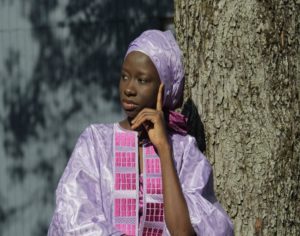 Project Statement: Fatoumata’s project is focused on the multifaceted effects of poverty and how it has impacted developing and wealthy countries such as the United States. From her statement: Developing long-term strategies to fight poverty is crucial to the advancement of our world and future. Poverty is a multidimensional issue that negatively impacts millions globally every day. Poverty cannot be solved without addressing its existential causes, however. These causes include gender inequality, racial injustice, political norms, and the ongoing effects of colonization and globalization. As a dual citizen who is both African and American, I have a built-in multicultural, multidimensional perspective. Growing up in West Africa, many live on less than $2 a day, and severe drought caused by climate change has deteriorated the living standards of agrarian populations. As a naturalized American, I have witnessed citizens in the U.S., one of the wealthiest countries in the world, struggle to feed their children and families each day. In places like rural Appalachia, many are in pain to have one meal a day. They lack access to nutritious food and adequate health care and suffer both from external and internalized deprivation. Before we can advance equity and justice for all, we must tackle the root causes of poverty and provide access to basic human needs of all people, including access to sustainable and healthy food, basic housing, education and health care.
Project Statement: Fatoumata’s project is focused on the multifaceted effects of poverty and how it has impacted developing and wealthy countries such as the United States. From her statement: Developing long-term strategies to fight poverty is crucial to the advancement of our world and future. Poverty is a multidimensional issue that negatively impacts millions globally every day. Poverty cannot be solved without addressing its existential causes, however. These causes include gender inequality, racial injustice, political norms, and the ongoing effects of colonization and globalization. As a dual citizen who is both African and American, I have a built-in multicultural, multidimensional perspective. Growing up in West Africa, many live on less than $2 a day, and severe drought caused by climate change has deteriorated the living standards of agrarian populations. As a naturalized American, I have witnessed citizens in the U.S., one of the wealthiest countries in the world, struggle to feed their children and families each day. In places like rural Appalachia, many are in pain to have one meal a day. They lack access to nutritious food and adequate health care and suffer both from external and internalized deprivation. Before we can advance equity and justice for all, we must tackle the root causes of poverty and provide access to basic human needs of all people, including access to sustainable and healthy food, basic housing, education and health care.
Leeah Derenoncourt- Emerson College
Project topic: Youth Advocacy
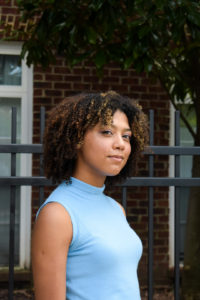 Project Statement: In 2018 17 children were murdered at a high school in Florida.
Project Statement: In 2018 17 children were murdered at a high school in Florida.
In response to this tragedy, a uniquely impactful movement began. These students
harnessed the power of storytelling, media relations, and social media to soon become the March For Our Lives we know today.
Gun Violence. Gender Violence. Climate Change. Voter Suppression.
We live in a world that is hurting. Born into this broken world, young people have risen up
and said no.
A few years ago, I joined Generation Ratify, a youth-led advocacy group fighting for the
ratification of the Equal Rights Amendment. As I managed their PR for 8,000 members across 55 chapters, I learned that though youth advocacy groups function on an extremely impactful level, they largely don’t have access to the same resources professional advocacy groups do.
In response, I’ve developed Agitate, a public relations agency supporting youth social
impact and advocacy groups, pro bono. By outsourcing communications efforts these groups can streamline their resources towards organizing. Learn more at https://rb.gy/ydklf7
My work on the communications front is just the beginning.
Movements for change are already happening. Our next big effort must not simply be to
add new ones but to enhance and support the existing—on all levels. We need to make social
movements not only great but known.
Maddie DeMarco-Master’s student at St. Joseph’s University
Project topic: Food Insecurity
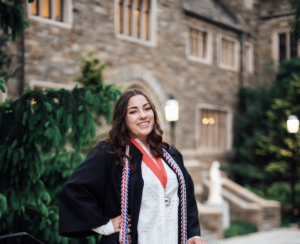 Project Statement: Efforts to move away from industrial food systems and alter corporate agricultural processes are instrumental to the development of a more just, sustainable and equitable world. While developed countries produce and export crops essential for life across the world, less developed countries are made to rely on these transactions in order to feed their populations. At the same time, corporate agriculture exploits native land and labor to export delicacy foods to rich countries.
Project Statement: Efforts to move away from industrial food systems and alter corporate agricultural processes are instrumental to the development of a more just, sustainable and equitable world. While developed countries produce and export crops essential for life across the world, less developed countries are made to rely on these transactions in order to feed their populations. At the same time, corporate agriculture exploits native land and labor to export delicacy foods to rich countries.
The current war in Ukraine makes clear an additional problem. The poor depend on exports from a prime global human rights abuser (Russia) and for the near term, the war’s destruction of Ukrainian agricultural land and closing of ports mean major disruptions in food supply. Thus, flawed industrial and global food systems have to be changed. A transformation empowers developing countries to create localized food systems and promote equality throughout production and distribution efforts. In a world of market power and conflict which fuels injustice and hunger, supporting countries to sustainably feed themselves will reduce inequality and promote more equitable development.
This program would allow me to build on my accomplishments in increasing food accessibility while explicitly addressing sustainability and equity in a global context.
Wai Sin Wan- Murdoch University (AUS)
Project topic: Cooking Fuel
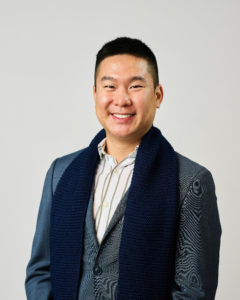
Project Statement: Over 2.8 billion people in the world lack access to clean cooking facilities, relying instead on solid biomass (eg charcoal), kerosene or coal as their primary cooking fuel. Household air pollution, mostly from cooking smoke, is linked to around 2.5 million premature deaths a year with women (indirectly contributing to gender equality) and children being the most vulnerable.
Progress has been slow to address the lack of access to clean cooking fuels compounded by the increased in poverty induced by the COVID-19 crises and the subsequent supply-chain disruptions and energy price increases has led many households in rural or peri-urban areas to backslide into using charcoal, kerosene or fuelwood.
Hence, I believe that a concentrated effort to towards the development and enabling of access to clean cooking fuels is crucial to the Post-Pandemic recovery and the immediate future of our world. Addressing this challenge will reverse the dramatic damages to health and impairment of productivity of communities in developing countries which is important in restoring disproportionate equity and justice in accessing clean, safe and effective cooking for communities in transforming food ingredients into meals, and the flow on benefits for the environment by reducing the unsustainable harvesting of fuel wood which also contributes to deforestation.
See 2021’s winners here or read our other academic related blog posts here.
